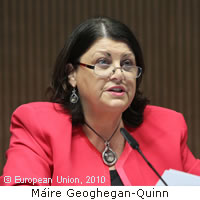Commissioner gives strong performance in maiden online debate
'This autumn I will present the European Commission's Innovation Union Strategy. I want your help in creating this strategy,' said the EU's Research, Innovation and Science Commissioner, Máire Geoghegan-Quinn, at the start of her first live webchat on 17 June. Some 600 people watched the hour-long online discussion, the aim of which was to encourage debate with the Commissioner on the concept of the Innovation Union - where Europe should be in 2020 and what we need to do to get there. Before opening the floor for questions, the Commissioner briefly outlined her vision for the research and innovation strategy. 'We need to transform Europe into a really vibrant innovation economy,' she underlined. This would mean tackling bottlenecks, developing an EU patent, coordinating national research funding and taking measures on researcher mobility and research infrastructures. Comments from online viewers were soon streaming in, and over the course of the debate Mrs Geoghegan-Quinn fielded questions on a wide range of topics. The forthcoming Research and Innovation Strategy is part of the EU's wider Europe 2020 Strategy which sets out how the EU plans to come out of the economic crisis as a 'smart, sustainable and inclusive economy'. A number of participants quizzed the Commissioner on why Europeans should have faith in the 2020 Strategy. 'How is the EU 2020 Strategy different from the Lisbon agenda?' wondered one Spanish participant. 'Does the EU really mean business this time around?' The Commissioner's answer to this was a resounding 'yes'. This time, research and innovation is at the centre of the policy, she explained. Describing the 2020 Strategy as 'a comprehensive response' that was 'thought out very carefully', she added that it already has the support of the European Parliament and Council. 'I think you will see a different response to this than the Lisbon Strategy,' she commented. One questioner asked whether through its emphasis on innovation, the Commission might lose sight of general research. The Commissioner denied this, pointing out that 'you can't have innovation unless you have the basic research to begin with'. Commenting that Europe is good at basic research, she praised the work of the European Research Council (ERC) and said: 'I want to develop that even further. Basic research for me is fundamental.' The problem, according to the Commissioner, is linking up research and innovation. 'We need to find out why is it that those good ideas from basic research don't make it all the way to the marketplace,' she said. On the topic of the research budget, Mrs Geoghegan-Quinn emphasised that 'we need to encourage Member States that this is an area they should not cut because it does bring benefits at the end of the day'. SMEs (small and medium-sized enterprises), which Mrs Geoghegan-Quinn called 'the backbone of the economy', also proved a popular topic. 'They tell me they have difficulty accessing parts of the Framework Programme,' she noted, indicating that the interim evaluation of the Seventh Framework Programme (FP7) would hopefully deliver some specific suggestions on how to improve things. The evaluation is being carried out now and should be released in the autumn. Another 'big priority' for the Commissioner is the role of women in science. Expressing her concern that so few women make it to the top of the research career ladder, she called for role models and emphasised the importance of finding ways of encouraging employers to make sure their workplaces are family-friendly. In total the Commissioner responded to 20 questions; other subjects covered included the fusion reactor ITER ('probably the most exciting energy project anywhere in the world'), public procurement ('a big opportunity') and international competition ('I don't think we should lose sight of our strengths'). Although the online webchat is over, the debate continues; Commissioner Geoghegan-Quinn will post on her website written responses to some common questions which could not be answered during the event due to the lack of time. In addition, the Commission has created an Innovation Union page on Facebook.



